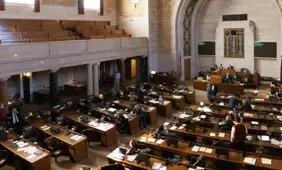Atlantic City's Controversial Casino PILOT Program up for Renewal
The Atlantic City casino payment-in-lieu-of-taxes (PILOT) program is set to expire next year, prompting discussions among state lawmakers and stakeholders about its potential renewal. The program, first implemented in 2016, was designed to stabilize city finances by eliminating ongoing casino property tax appeals.

Instead of traditional property taxes, each casino contributes a share of an industry-wide assessment based on gross gaming revenue. The funds generated through this program are distributed to Atlantic City, its school district, and Atlantic County to support operations.
Related: Atlantic City Casino PILOT Tax Plan Heads Back to CourtSen. Vince Polistina stated that discussions on a new PILOT bill have begun, with initial conversations taking place between lawmakers and the governor's administration. Further discussions will involve city and county officials to ensure a consensus before any new legislation is passed. The intention is to create a proposal that is agreed upon by all key stakeholders before moving forward in the legislative process.
Atlantic City has received substantial funding from the PILOT program, with over $48.5 million allocated to the city last year and $51.6 million received in 2023. The original agreement was put in place at a time when the city faced the possibility of bankruptcy, providing a predictable revenue stream that helped stabilize local government finances.
The continuation of the PILOT program is seen by some as essential to maintaining financial stability and avoiding a return to the uncertainty that existed before its implementation. The increased attention the iGaming segment is receiving is also causing concerns.
Polistina expressed that a return to traditional real estate taxes for casinos is unlikely, as the PILOT program provides certainty for both the city and the gaming industry. The sentiment is that maintaining the PILOT program indefinitely would ensure a stable financial framework for Atlantic City. However, concerns remain among county officials regarding the financial impact on the region.
The current state takeover of Atlantic City is set to conclude this year, and discussions surrounding the PILOT program and Municipal Stabilization and Revitalization Act (MSRA) are expected to continue. Mayor Marty Small Sr. stated that the city and state have maintained a strong working relationship and anticipates continued cooperation if MSRA is extended.
More Business News
Atlantic County Not Receiving Benefits
Atlantic County Executive Dennis Levinson stated that the county has not been contacted regarding a new PILOT agreement and believes that discussions should not take place until the county receives outstanding funds owed under the existing arrangement. The county claims it is still owed $14 million and argues that any new agreement should ensure that past financial obligations are met before moving forward.
County officials have long maintained that the PILOT program has underpaid them. In 2018, a consent agreement was reached between the county and the state, stipulating that Atlantic County would receive 13.5% of PILOT payments through 2024, followed by a 12% allocation for the final two years.
The county has since argued that a 2021 revision to the PILOT program unfairly deprived it of its negotiated share of casino revenue. This revision removed online gaming and online sports betting from the calculation of gross gaming revenue, reducing the amount casinos had to pay by approximately $55 million annually. The state justified the change by citing competition from neighboring states and the economic impact of the COVID-19 pandemic on the gaming industry.
Polistina also stated that discussions are ongoing regarding a new version of the MSRA, which governs the state's financial oversight of Atlantic City. Additional talks include potential revisions to the Casino Reinvestment Development Authority (CRDA) and Investment Alternative Tax (IAT) funds, which have been under review for several months. The goal is to avoid a last-minute legislative scramble, as occurred in the past.
The IAT funds, which include a 1.25% tax on brick-and-mortar casino gaming revenue and a 2.5% tax on internet gaming revenue, were initially allocated to the CRDA for investment in Atlantic City's tourism industry. However, under state takeover legislation enacted in 2022, these funds have instead been directed toward paying down the city's municipal debt. Records indicate that Atlantic City received nearly $68.17 million in IAT funding last year.
RELATED TOPICS: Business
Most Read
Must Read
 Interviews
Interviews
Sweepstakes Casinos: Thriving in an Ever-Changing Industry – Interview with Attorney Stephen C. Piepgrass
Feb 17, 2025 Interviews
Interviews







Review this New Post
Leave a Comment
User Comments
Comments for Atlantic City's Controversial Casino PILOT Program up for Renewal